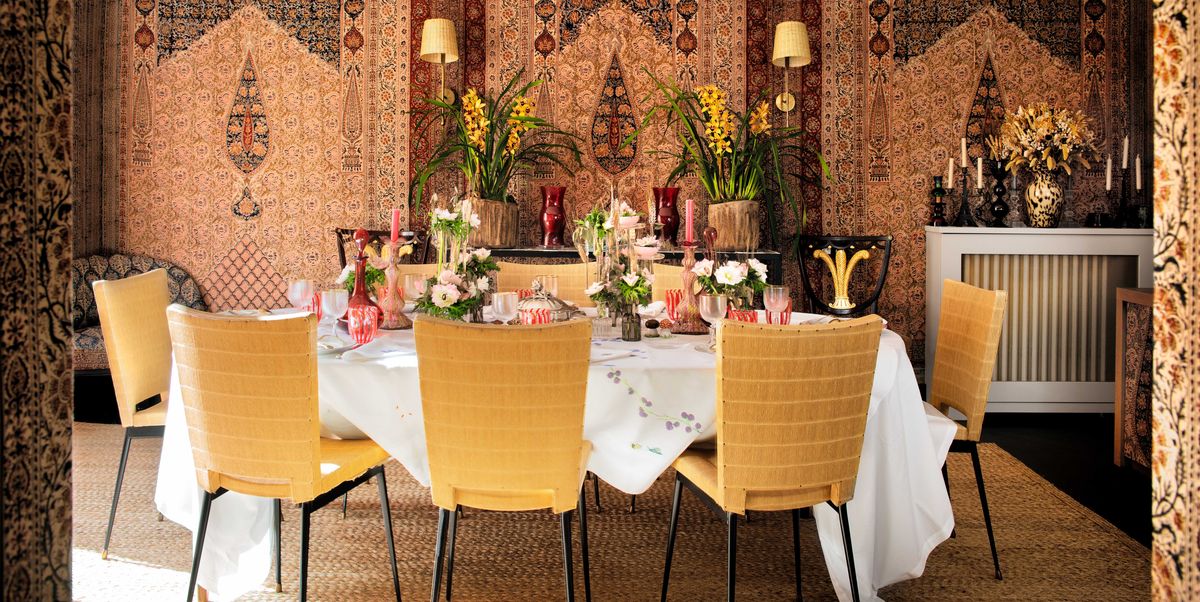This Dior Executive’s Paris Apartment Is Truly a Feast for the Eyes

In a small but exquisite 19th-century building, in the very grand Parisian neighborhood of Passy, Mathilde Favier swings open the door of her newly redesigned apartment, which is, as is she, effervescent, original, and almost absurdly chic. Her hair is a dark blond pixie, her eyes sparkle, and her smile could power a good part of the French capital. Favier is from a family with deep fashion roots: Her sister Victoire de Castellane designs the fine jewelry at Christian Dior, and her uncle Gilles Dufour, the longtime right hand of Karl Lagerfeld at Chanel, is a designer and man-about-town. After working in public relations for Prada, Favier has, for the past decade, managed celebrity clients at Christian Dior.
She is now an empty nester, with her two children from her marriage to financier Robert Agostinelli living abroad. “And I’m in love with the man I want to spend the rest of my life with,” she says of her fiancé, film producer Nicolas Altmayer.
The inspiration for her apartment’s interior began with Christian Dior’s spring 2020 haute couture show, when the artist Judy Chicago collaborated with Christian Dior designer Maria Grazia Chiuri on a presentation entitled the Female Divine. Held in the gardens of the Rodin Museum, the show was staged in a massive white structure in the shape of a reclining goddess figure, with 21 banners hand-embroidered with a series of punchy statements, including the central query, “What If Women Ruled the World?” The runway was covered in lilac carpet with a millefleur pattern, which Favier has repurposed for the stairway of her apartment.
William Middleton: The floral rug was your starting point?
Mathilde Favier: Everything in this house came from that design. The Dior presentation was in January 2020, right before the world changed. I saw it, I loved it, and I said, “OK, I’m redoing my apartment.”
WM: You have been redecorating during the city’s many lockdowns. How challenging was that?
MF: In some ways I did not mind because I was in my place, on my own, just me and my fiancé. And having some solitude is when ideas can come. I realized more than ever that an interior should be a refuge.
WM: What were your goals with the new decor?
MF: Much like how you wake up in the morning and dress yourself, how you furnish a home is a reflection of your personality at any given moment. Before, I had things in here that were pretty simple, but it felt a bit like a hotel. So now it is something of a happy mess, but it is my happy mess.
WM: What elements are the most meaningful for you?
MF: I adore all of the patterns, many of which came from the Simrane shop on the rue Bonaparte, this magnificent place that has fabrics and prints from India. I have always loved traveling, and one of the first things I do in a foreign country is to try to meet people who are artisans and craftsmen. It is the culture of a country that I find fascinating. So in my place there are fabrics that were woven in Spain, prints and patterns from Rajasthan, and a rug from Romania. It is a mix that could be overwhelming, but that taken together I somehow find grounding.
WM: You oversaw the decoration of your space with the help of an interior architect, Brenda Altmayer, who is the sister-in-law of your partner, Nicolas. Have you worked with decorators in the past?
MF: I had the good fortune to have three apartments designed by Jacques Grange. I’ve always been sure of my taste, but Jacques helped me avoid falling into any kind of trap. Often, I would say, “Oh, I love this,” and he was like, “You’re right—it’s adorable—but what if we did this instead?” And it was always something just a little more fearless and interesting.
WM: You are often described as the ultimate Parisienne—how would you characterize the Paris woman?
MF: She dares! She engages in a certain audacity. I would say that I am not afraid, or am no longer afraid, of making a mistake—in fact, I even enjoy making them. And the Parisienne that I would like to be also has an appetite for life—that is super important. You see people who are young, attractive, well dressed, and seem completely bored. Having a zest for life needs to be cultivated. I also think the notion of charm is very important. It makes others want to be with you, to stay a while and talk a little more. And finally, it is about that French art de vivre, knowing how to receive someone, how to make someone feel comfortable. To me, that feels particularly urgent right now.
This story originally appeared in the September 2021 issue of ELLE DECOR. SUBSCRIBE
This content is created and maintained by a third party, and imported onto this page to help users provide their email addresses. You may be able to find more information about this and similar content at piano.io








